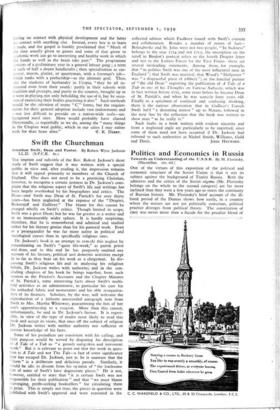Swift the Churchman Jonathan Swift, Dean and Pastor. By Robert
Wyse Jackson, LL.D. (S.P.C.K. 6s.) THE imprint and sub-title of the Rev. Robert Jackson's short study of Swift suggest that it was written with a special public in view and, after reading it, the impression remains that it will appeal primarily to members of the Church of England. One does not need to be a practising Christian, however, to recognise a certain justness in Dr. Jackson's com- plaint that the religious aspect of Swift's life and writings has been largely overlooked by his biographers and critics. The Dean—and Swift was Dean of St. Patrick's for over thirty. years—has been neglected at the expense of the "Drapier, Bickerstaff and Gulliver." The blame for this cannot be charged wholly on Swift's critics. Though limited in scope, Swift was a great Dean; but he was far greater as a writer and in an immeasurably wider sphere. It is hardly surprising, therefore, that he is remembered and admired and studied rather for his literary genius than for his pastoral work. Even as a propagandist he was far more active in political and sociological causes than in specifically religious ones.
Dr. Jackson's book is an attempt to remedy this neglect by concentrating on Swift's " quiet life-work," as parish priest and dean, and to this end he has purposely omitted any account of his literary, political and domestic activities except in so far as they bear on his work as a clergyman. In dis- cussing Swift's religious life and in analysing his religious beliefs, Dr. Jackson writes with authority; and in the con- cluding chapters of his book he brings together, from such sources as the Proctor's Accounts and the Chapter Minutes of St. Patrick's, some interesting facts about Swift's multi- fold activities as an administrator, in particular his care for the cathedral fabric and monuments and his able reorganisa- tion of its finances. Scholars, by the way, will welcome the reproduction of a hitherto unrecorded autograph note from Swift to Mrs. Martha Whiteway, guaranteeing the fees of her son's apprenticeship to a surgeon. More than this cannot, unfortunately, be said in Dr. Jackson's favour. It is regret- able, in view of the type of reader most likely to read this book and accept its views, that once off the subject of religion Dr. Jackson writes with neither authority nor sufficient or precise knowledge of his facts.
Some of his prejudices are consistent with his calling, and little purpose would be served by disputing his description of A Tale of a Tub as "a grossly outspoken and irreverent work." But it is relevant to point out that the work in ques- tion is A Tale and not The Tale—a fact of some significance that has escaped Dr. Jackson, just as he is unaware that the " form" is a deliberate and delicious parody. Similarly, it would be idle to dissent from his opinion of " the loathsome dirt of some of Swift's later degenerate pieces." He is not, however, entitled to state that " it is certain Swift was not responsible for their publication " and that " we must blame scavenging, profit-seeking booksellers " for circulating them in print. This is simply not true; the pieces in question were published with Swift's approval and were reprinted in the collected edition which Faulkner issued with Swift's consent and collaboration. Besides a number of errors of fact— Bolingbroke and St. John were not two people; " In Sickness" belongs to the year 1714 and not 1713; the inscription on the scroll in Bindon's portrait refers to the fourth Drapier letter and not to the Letters Patent for the First Fruits—there are several misleading statements. Among them, for example, that "in politics Swift was one of the most influential men in England "; that Swift was married; that Wood's " Halfpence " was "a disgraceful piece of jobbery "; or the fanciful picture of " the old Dean " regretting the publication of A Tale of a Tub in one of his Thoughts on Various Subjects, which was in fact written before 1711, some years before he became Dean of St. Patrick's, and when he was scarcely forty years old. Finally as a specimen of confused and confusing thinking, there is the curious observation that in Gulliver's Travels Swift held "a distorting mirror" up to Nature, followed in the next line by the reflection that the book was written to show man " as he really is."
Such faults in a book written with evident sincerity and from a neglected angle are particularly to be regretted, since some of them need not have occurred if Dr. Jackson had referred to such authorities as Nichol Smith, Williams, Gold


































 Previous page
Previous page